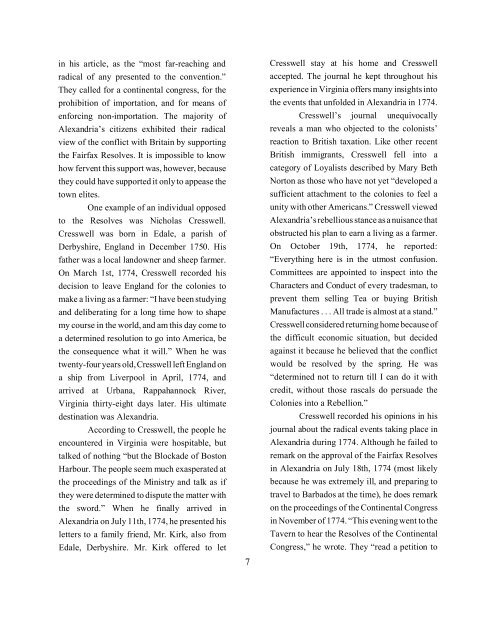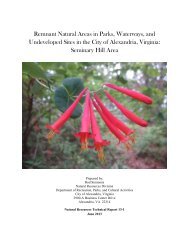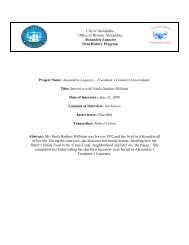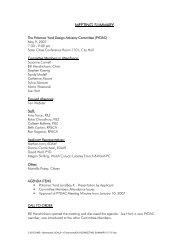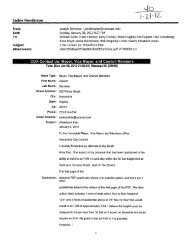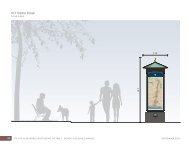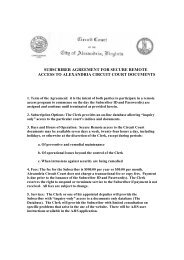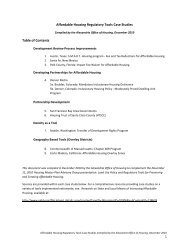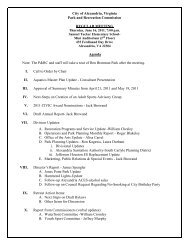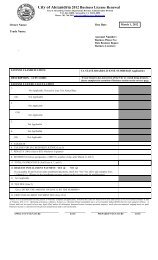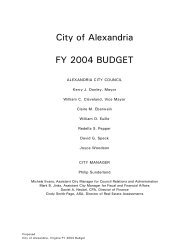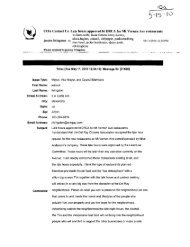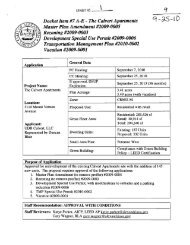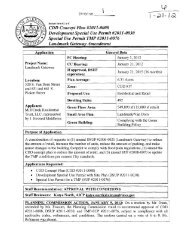LOYALISM IN EIGHTEENTH CENTURY ... - City of Alexandria
LOYALISM IN EIGHTEENTH CENTURY ... - City of Alexandria
LOYALISM IN EIGHTEENTH CENTURY ... - City of Alexandria
Create successful ePaper yourself
Turn your PDF publications into a flip-book with our unique Google optimized e-Paper software.
in his article, as the “most far-reaching and<br />
radical <strong>of</strong> any presented to the convention.”<br />
They called for a continental congress, for the<br />
prohibition <strong>of</strong> importation, and for means <strong>of</strong><br />
enforcing non-importation. The majority <strong>of</strong><br />
<strong>Alexandria</strong>’s citizens exhibited their radical<br />
view <strong>of</strong> the conflict with Britain by supporting<br />
the Fairfax Resolves. It is impossible to know<br />
how fervent this support was, however, because<br />
they could have supported it only to appease the<br />
town elites.<br />
One example <strong>of</strong> an individual opposed<br />
to the Resolves was Nicholas Cresswell.<br />
Cresswell was born in Edale, a parish <strong>of</strong><br />
Derbyshire, England in December 1750. His<br />
father was a local landowner and sheep farmer.<br />
On March 1st, 1774, Cresswell recorded his<br />
decision to leave England for the colonies to<br />
make a living as a farmer: “I have been studying<br />
and deliberating for a long time how to shape<br />
my course in the world, and am this day come to<br />
a determined resolution to go into America, be<br />
the consequence what it will.” When he was<br />
twenty-four years old, Cresswell left England on<br />
a ship from Liverpool in April, 1774, and<br />
arrived at Urbana, Rappahannock River,<br />
Virginia thirty-eight days later. His ultimate<br />
destination was <strong>Alexandria</strong>.<br />
According to Cresswell, the people he<br />
encountered in Virginia were hospitable, but<br />
talked <strong>of</strong> nothing “but the Blockade <strong>of</strong> Boston<br />
Harbour. The people seem much exasperated at<br />
the proceedings <strong>of</strong> the Ministry and talk as if<br />
they were determined to dispute the matter with<br />
the sword.” When he finally arrived in<br />
<strong>Alexandria</strong> on July 11th, 1774, he presented his<br />
letters to a family friend, Mr. Kirk, also from<br />
Edale, Derbyshire. Mr. Kirk <strong>of</strong>fered to let<br />
7<br />
Cresswell stay at his home and Cresswell<br />
accepted. The journal he kept throughout his<br />
experience in Virginia <strong>of</strong>fers many insights into<br />
the events that unfolded in <strong>Alexandria</strong> in 1774.<br />
Cresswell’s journal unequivocally<br />
reveals a man who objected to the colonists’<br />
reaction to British taxation. Like other recent<br />
British immigrants, Cresswell fell into a<br />
category <strong>of</strong> Loyalists described by Mary Beth<br />
Norton as those who have not yet “developed a<br />
sufficient attachment to the colonies to feel a<br />
unity with other Americans.” Cresswell viewed<br />
<strong>Alexandria</strong>’s rebellious stance as a nuisance that<br />
obstructed his plan to earn a living as a farmer.<br />
On October 19th, 1774, he reported:<br />
“Everything here is in the utmost confusion.<br />
Committees are appointed to inspect into the<br />
Characters and Conduct <strong>of</strong> every tradesman, to<br />
prevent them selling Tea or buying British<br />
Manufactures . . . All trade is almost at a stand.”<br />
Cresswell considered returning home because <strong>of</strong><br />
the difficult economic situation, but decided<br />
against it because he believed that the conflict<br />
would be resolved by the spring. He was<br />
“determined not to return till I can do it with<br />
credit, without those rascals do persuade the<br />
Colonies into a Rebellion.”<br />
Cresswell recorded his opinions in his<br />
journal about the radical events taking place in<br />
<strong>Alexandria</strong> during 1774. Although he failed to<br />
remark on the approval <strong>of</strong> the Fairfax Resolves<br />
in <strong>Alexandria</strong> on July 18th, 1774 (most likely<br />
because he was extremely ill, and preparing to<br />
travel to Barbados at the time), he does remark<br />
on the proceedings <strong>of</strong> the Continental Congress<br />
in November <strong>of</strong> 1774. “This evening went to the<br />
Tavern to hear the Resolves <strong>of</strong> the Continental<br />
Congress,” he wrote. They “read a petition to


